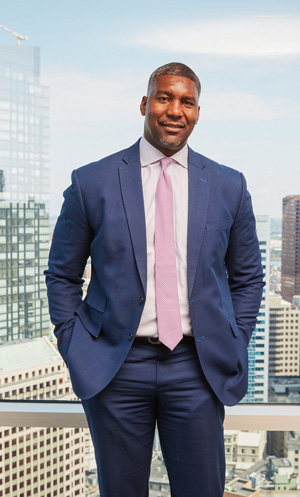State Street’s First Chief Diversity Officer
Former New England Patriot Paul Francisco is charged with financial giant’s global strategy for diversity and inclusion
Former New England Patriot Paul Francisco is charged with financial giant’s global strategy for diversity and inclusion
As a student at BU, Paul Francisco was surrounded by diversity. He joined the black student union and the Latinos Unidos student network. He played football with teammates from a variety of backgrounds and lived in Rich Hall with students from around the world.
So it was a “shock to the system,” says Francisco (CGS’91, CAS’93), to enter the corporate ranks and see mostly white, male faces.
“I started wondering, ‘What happened to that richness I experienced in college? How come it’s not here? Where did they go?’”
Francisco has since built a career around drawing the diversity he saw in college into the corporate world. He has worked to attract and retain diverse talent at Amica Insurance, Gillette, and Bank of America. In March 2017, Boston-based financial services giant State Street Corporation named Francisco its first chief diversity officer, charging him with overseeing the company’s global strategy for diversity and inclusion.

A native of Honduras, Francisco attended BU on a football scholarship and majored in political science with hopes of becoming a civil rights lawyer. But instead of attending law school after graduation, he signed as a free agent with the Miami Dolphins. His football career showed real promise. “I think when you look at the big tight ends from teams like the Giants, Kansas City, and Pittsburgh, he could end up in that category,” Dolphins assistant offensive line coach Rich McGeorge told the Sun Sentinel in 1994. “He has the frame and athletic ability to be that kind of player.”
It didn’t work out that way. Francisco spent just three years in pro football, including a stint with the New England Patriots, before a neck injury cut his playing career short. While he considered his options, a BU friend connected him to a job in the insurance industry. Francisco’s position wasn’t in human resources, but—dismayed by the lack of diversity in his company—he soon began volunteering at recruiting events. “My career took off from there,” he says, “and my interests and my passion became around equity in the workplace.”
In 2011, Francisco joined State Street, where he has held several titles related to diversity and inclusion. As the company prepared to celebrate its 225th anniversary this spring, its leaders decided to place greater emphasis on diversity by creating the position of chief diversity officer and invited Francisco to take the role.
Francisco now heads a team of 14 people worldwide who are responsible for developing programs and processes to make State Street as inclusive as possible. “We want to be known as an employer of choice,” says Francisco, “and a place where anyone can come in and feel like they belong and like they can add value to the organization.” According to the company’s 2016 Corporate Responsibility Report, State Street aims to increase female representation at the assistant vice president level from 40.5 percent at the end of 2014 to 43 percent by the end of 2017 and the number of employees of color at the same level from 26.7 percent to 30 percent.
Creating a diverse workplace begins with recruitment, Francisco says, so his team partners with State Street’s university relations staff to ensure they’re digging deep, finding all the potential talent on campus. Instead of simply attending a general career fair, for example, recruiters might also host an event at the campus multicultural center and meet with business fraternities and cultural student organizations.
To improve hiring, State Street requires hiring managers to interview a diverse slate of candidates for all top-level roles (managing director and above). The policy, says Francisco, resembles the National Football League’s Rooney Rule, which requires teams to interview minority candidates for head coaching jobs and has been credited with increasing the number of black coaches in the league.
To foster a more inclusive company culture, Francisco says State Street provides unconscious-bias training to its senior leaders, helping them recognize when following their instincts may be leading to flawed decisions, such as failing to promote talented employees who aren’t members of an “in circle.” The company also encourages employees to join one or more of its 30-plus employee networks, which range from the Latin America Professionals Group and the Global Pride Network to the Military Employee Network and the Disability Awareness Alliance. These groups, says Francisco, “create a feeling that, no matter who I am at State Street, I can be successful and have a community that I can identify with.”
Francisco advises anyone aiming to create a more diverse workplace to measure their efforts; tracking progress in interviewing, hiring, training, and retaining diverse talent can provide insight into which strategies work and which don’t. Additionally, he says, “there are some qualitative things you want to measure. You want to get a sense of the environment and whether it is, in fact, a more accepting, collaborative, inclusive culture.” And he implores company leaders to be authentic. “You have to be real. You cannot just pay lip service to this work because it will become readily apparent when you’re doing that,” he says. “When it comes to diversity and inclusion, the other thing I tell folks is, it’s a journey. It’s not something that you can get done overnight. It’s not something that you’re going to get right the first time or even the second time you do it.” But if you have a vision of what you want your organization to be, he says—in a lesson that would work just as well on the football training field—persistence will get you there.